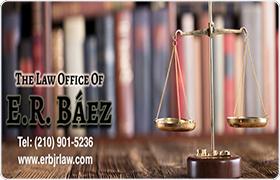D Hanis DUI-DWI Lawyer, Texas
Sponsored Law Firm
-
 x
x

Click For More Info:
-
The Law Office of E.R. Báez
700 N. Saint Mary's Street Suite 1400 San Antonio, TX 78205» view mapCriminal Defense Law The Pastor Lawyer
Every client is special to us and every client will be treated with respect and dignity. No matter how difficult the case may be, Mr. Báez will treat you with the upmost dignity.
800-903-7181
Not enough matches for D Hanis DUI-DWI lawyer.
Below are all D Hanis Criminal lawyers.
Nelson P. Skinner
Family Law, Criminal, Consumer Bankruptcy, Personal Injury
Status: In Good Standing Licensed: 40 Years
Anton Ernest Hackebeil
Commercial Real Estate, Oil & Gas, Family Law, Criminal
Status: In Good Standing Licensed: 41 Years
Andrew Julius Aelvoet
Litigation, Wills & Probate, Child Support, Criminal
Status: In Good Standing Licensed: 28 Years
Kimberly Ann Pepper Havel
Government, Criminal, Administrative Law, Juvenile Law
Status: In Good Standing Licensed: 21 Years
David B. Black
Lawsuit & Dispute, Immigration, Government, Criminal
Status: In Good Standing Licensed: 48 Years
 E.R. Báez San Antonio, TX
E.R. Báez San Antonio, TX Practice AreasExpertise
Practice AreasExpertise
